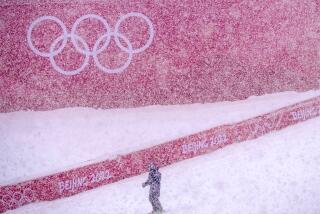Gerg Likes the Results, but Not Skiing Parallel
- Share via
MAMMOTH — A World Cup ski race resurrected with American viewing interests in mind was dominated here Friday by Europeans who can’t stand it.
Germany’s Hilde Gerg defeated countrywoman Martina Ertl, winning the controversial parallel event, a hybrid slalom and giant slalom that has returned on a limited basis to the World Cup circuit for the first time since 1975.
Austria’s Alexandra Meissnitzer finished third, and Katja Seizinger of Germany was fourth.
Irony?
The race, perfectly tailored to America’s need for clear-cut winners and losers, did not include a U.S. skier, none of whom ranked high enough to qualify.
Unlike the downhill, super-G, slalom and giant slalom, the parallel is not raced against a clock. In a 32-person bracket--only 26 racers on Friday, however--skiers race head-to-head on parallel courses in a single elimination format similar to the NCAA basketball tournament.
There are two races per round, the skiers switching courses after the first race. If the heats are split, the racer with the better time advances.
The parallel is not an Olympic event, nor will there be an individual World Cup parallel champion crowned, but it does earn valuable World Cup overall points, compelling the world’s best all-around racers to participate.
“It’s too hard if you ski four disciplines,” Gerg said of the parallel.
Even so, she picked up 100 World Cup points for her trouble.
Seizinger, the reigning Olympic downhill champion, is one of the parallel’s biggest critics.
“It’s two disciplines in one course,” she said. “We all don’t like that. I think four disciplines is enough.”
Fatigue is another concern. The top four finishers skied 10 races Friday, and now must come back for today’s super-G, which was postponed Thursday because of heavy snowfall.
“You’re a little bit tired,” Gerg said. “But every girl skiing today will have the same problem.”
Gerg is the reigning World Cup super-G champion and she, along with Seizinger and Ertl, will be among today’s favorites.
The super-G was shortened a bit for safety concerns, the race crew unable to tend to all the snow near the steep start.
With Picabo Street not yet ready to return because of a knee injury, it is unlikely that any American will crack the top 30, although 18-year-old Jonna Mendes, from South Lake Tahoe, is a fast-developing talent who has skied Mammoth for years.
More to Read
Go beyond the scoreboard
Get the latest on L.A.'s teams in the daily Sports Report newsletter.
You may occasionally receive promotional content from the Los Angeles Times.







